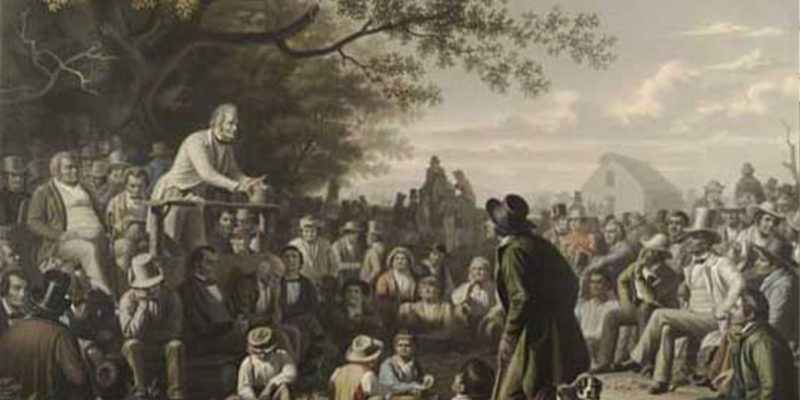Is it possible for a society to be good without liberty? Bacon’s The New Atlantis and Le Guin’s The Ones Who Walk Away From Omelas both aid in exploring this important question.
Sir Thomas Moore coined the term “utopia” in 1516. The term utopia was taken from the Greek phrase meaning “no place,” which ultimately implies that utopian societies are not only perfect, but unattainable. Utopias are often characterized as societies with ideal laws and social conditions, impeccably happy citizens, and “a clamor of bells that set the swallows soaring” (Le Guin 1973, 1). While many would like to believe that utopian societies are possible, they are not necessarily desirable. The Ones Who Walk Away From Omelas by Ursula Le Guin and The New Atlantis by Francis Bacon are examples of utopian societies that do not conform to what citizens today may want in a society. Omelas and Bensalem both feature exploitation and limit information, which means that happiness in these societies is achieved at the expense of liberty. Is it possible for a society to be good without liberty?
Omelas is a picturesque city where its citizens live in prosperity with very little government control and few laws. The people are wholly happy, but are not naïve in the way that most would expect in a society free from pain. Le Guin discusses the realism of the society at length, stating that the people “were mature, intelligent, passionate adults whose lives were not wretched” (Le Guin 1973, 1). The city of Omelas has no secrets from its people. There are no skeletons in the closet of Omelas and no dirty secrets that its elders wish to hide from the rest of the population. However, if there were a skeleton that the people wished to hide from the world, it would be what was hidden in the cold, dark basement underneath one of the beautiful buildings of Omelas. The city of Omelas is not without pain, not completely at least. In this cold, dark and possibly wet basement is a sight that sends most of the people of Omelas home filled with dread and disgust. Some do not even go home at all, choosing to leave the city and the atrocity it depends on forever. This basement holds a child, small and malnourished, who looks barely the age of six. The child is afraid and barely alive, trapped in a room merely the size of a broom closet. The child is occasionally visited by citizens who look on with disgust and kicked as it pleads to be let out, that it will “be good” (Le Guin 1973, 3).
In exchange for the wealth and prosperity of Omelas, one child must suffer for the entirety of its life. Not a kind word or sentiment can be uttered to the child without the city falling into devastation. All of the citizens know of the child and are taken to see it from an early age. However, no one ever dares to save the poor soul, opting to forget the pain and suffering that allows them to be so happy. They convince themselves that this pain is necessary and that even if the child were to be saved, it would not get to experience happiness as the city would be destroyed immediately after the child was released. “To exchange all the goodness and grace of every life in Omelas for that single, small improvement: to throw away the happiness of thousands for the chance of the happiness of one: that would be to let guilt within the walls indeed” (Le Guin 1973, 4).” Some even leave the gates of Omelas, never to be seen again, though they make no move to save the child.
While it may be considered a rational choice to ignore the child for the betterment of society, this choice disregards one of the key principles of modern society: liberty. Liberty is the cornerstone of society now. In fact, most would be hard pressed to find anyone in democratic society that would be willing to give up their liberty for what they would consider a naïve happiness. This society flouts universal liberty because it allows for the exploitation of a person and denies it the same rights afforded to every other person in Omelas against its will. This mars the perfect façade of Omelas and turns many out of its borders in search of another place without the troubles that face them in Omelas. With the exploitation of this one person, is Omelas a perfect society or a utopia?
Similar issues arise on the island society of Bensalem featured in Francis Bacon’s New Atlantis. The society there seems perfect, much like Omelas before we learn of the child. It is run in part by a hierarchy of scientists called Salomon’s House, as well as a small government in charge of making laws. Salomon’s House is in charge of all exploration in and outside of Bensalem, with some in charge of traveling to other lands and finding new advancements and cures to ailments in Bensalem. The scientists of Salomon’s House make up a small portion of the population of Bensalem, and they are highly respected for the work they do in gaining and using information for the sake of the society. The highest-ranking member of Salomon’s House explains their mission: “The end of our foundation is the knowledge of causes, and secret motions of things; and the enlarging of the bounds of human empire, to the effecting of all things possible” (Bacon 2000, 19). In plain terms, he means that they seek enlightenment regarding all things dealing with human nature and life, almost as if the scientists are seeking a kind of omnipotence.
As it turns out, not all of the discoveries made in Salomon’s House are revealed to the public. In fact, Interpreters of Nature, another high-level position in Salomon’s House, have an extreme amount of power in Bensalem because they control who receives what information and when (Bacon 2000, 23). This is a dangerous proposition for the people of Bensalem. The scientists of Salomon’s House have every ability to withhold information from them and what is worse is that the people of Bensalem probably do not even know it is happening. They can be kept in the dark about so many things that could potentially affect their decisions about government and policy. In addition, the scientists of Salomon’s House can selectively disseminate information to sway the public’s opinions and influence government in the way that the scientists would like. This begs the question of who is really running Bensalem: the people or Salomon’s House?
The remedies that Omelas and Bensalem use to improve their societies endanger liberty, which makes it hard to consider Bensalem and Omelas utopias at all. In certain respects, these societies are socially just, because they afford equal rights or equal comfort to their citizens. However, they do not afford every citizen the same rights. Omelas illustrates this by exploiting the child for the sake of facilitating happiness for everyone else. The same can be said for Bensalem, where Salomon’s House can censor the information to achieve the results in society that would benefit them most.
In a way, Federalist 10 makes a case for the importance of liberty and the dangers of utopias. In this document, James Madison suggests two remedies for faction in society. He writes: “There are again two methods of removing the causes of faction: the one, by destroying the liberty which is essential to its existence; the other, by giving to every citizen the same opinions, the same passions, and the same interests (Madison 2001, 48).” The city of Omelas reflects the first remedy because to protect its society, the citizens take away liberty and happiness from the child. The city of Bensalem echoes the second remedy almost exactly. This remedy suggests that governments should use censorship or drugs to inculcate the same values and ideals in all its citizens. Then there would be no difference in thought and, therefore, everyone would participate and function in the same way. Bensalem does this by censoring the information the public has, creating the potential for all of the citizens to have similar thought processes. Madison later says that these remedies are “worse than the disease” and that “it could not be less folly to abolish liberty, which is essential to political life, because it nourishes faction, than it would be to wish the annihilation of air, which is essential to animal life, because it imparts to fire its destructive agency” (Madison 2001, 48). This means that such remedies should never be used.
Without liberty and information, as well as without the ability to express one’s opinions, beneficial political participation becomes impossible. The argument can be made, however, that if the society is perfect or if the most intelligent rule, then no change will be necessary. This is not so, because government has to change in order to continue to be relevant under different circumstances and time periods. Government should always be flexible enough to allow changes when necessary, and democratic logic means that participation is good in itself. While utopias are supposed to be perfect in social and governmental aspects, they cannot ever truly be perfect. This is because utopias almost inherently depend on denying liberty to one or more people. Without liberty, citizens cannot fully participate in government the way that they should for growth. For this reason, utopias will never be perfect socially or politically.
WORKS CITED
Bacon, Francis. 2000. Sir Francis Bacon’s The New Atlantis. William Fishburne, ed. The Project Gutenberg. Ebook Posted 2008.
Le Guin, Ursula. 1963. The Ones Who Walk Away From Omelas. The Winds Twelve Quarters: Short Stories. Harper & Row.
Madison, James. 2001. “Federalist 10.” In The Federalist, George Carey and James McClellen, eds. Indianapolis, IN: Liberty Fund.




 Compass is an online journal that provides a space for the work of talented undergraduates who have original and well-articulated insights on important ideas and issues relating to American democracy understood in the broad contexts of political philosophy, history, literature, economics, and culture.
Compass is an online journal that provides a space for the work of talented undergraduates who have original and well-articulated insights on important ideas and issues relating to American democracy understood in the broad contexts of political philosophy, history, literature, economics, and culture.